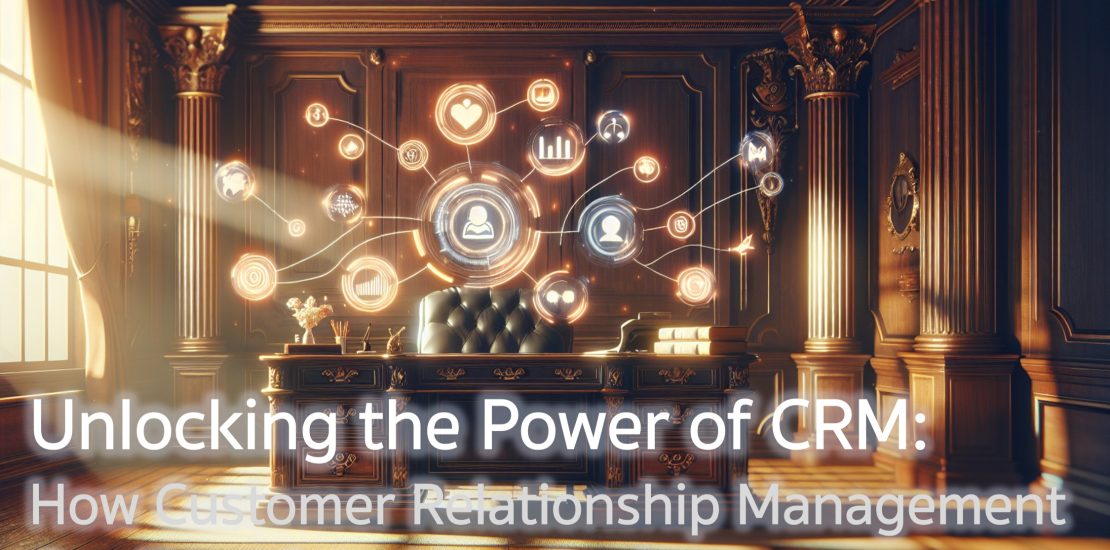Unlocking the Power of CRM: How Customer Relationship Management Can Transform Your Business

In the fast-paced world of business, customer relationships are the cornerstone of success. And there’s no better way to manage and nurture those relationships than with a robust Customer Relationship Management (CRM) system. But what exactly is CRM and how can it transform your business?
In this article, we will delve into the power of CRM and explore how it can revolutionize the way you interact with your customers. Whether you’re a small business looking to streamline your operations or a large corporation aiming to improve customer retention, CRM can be a game-changer.
By centralizing customer data, tracking interactions, and automating processes, CRM empowers businesses to better understand and serve their customers. From personalized marketing campaigns to improved customer service, CRM offers a range of benefits that can drive growth and profitability.
We’ll also explore the different types of CRM systems available, from cloud-based solutions to industry-specific platforms, and provide tips on choosing the right CRM for your business.
Join us as we unlock the power of CRM and discover how it can transform your business into a customer-centric powerhouse.
The importance of CRM for businesses
CRM, or Customer Relationship Management, is a strategy and technology that businesses use to manage and analyze customer interactions and data throughout the customer lifecycle. It enables businesses to build stronger relationships with their customers, improve customer satisfaction, and drive sales growth.
At its core, CRM is all about understanding and serving your customers better. By centralizing customer data, tracking interactions, and automating processes, CRM empowers businesses to gain a 360-degree view of their customers. This means having a deep understanding of their preferences, purchase history, communication preferences, and more.
With this wealth of information at their fingertips, businesses can tailor their products, services, and marketing efforts to meet the unique needs and preferences of their customers. By delivering personalized experiences, businesses can build trust, loyalty, and long-term relationships with their customers.
CRM also plays a crucial role in improving customer service. By having access to a customer’s history and previous interactions, businesses can provide a seamless and personalized support experience. This not only resolves issues more efficiently but also enhances customer satisfaction and loyalty.
In today’s competitive landscape, where customer expectations are constantly evolving, CRM is no longer just a nice-to-have tool. It has become an essential component of any successful business strategy.
Key features and benefits of CRM
A robust CRM system offers a wide range of features and benefits that can transform the way a business interacts with its customers. Let’s explore some of the key features and benefits:
- Centralized customer data: One of the most significant advantages of CRM is its ability to centralize customer data. Instead of scattered information across various systems and departments, CRM provides a single source of truth for all customer-related information. This allows businesses to have a holistic view of each customer, enabling them to tailor their interactions and offerings accordingly.
- Improved customer segmentation and targeting: With CRM, businesses can segment their customer base based on various criteria such as demographics, purchase history, preferences, and more. This enables businesses to create targeted marketing campaigns, personalized offers, and tailored communications, resulting in higher engagement and conversion rates.
- Enhanced sales processes: CRM systems provide sales teams with tools and automation capabilities that streamline the sales process. From lead generation and tracking to opportunity management and forecasting, CRM enables sales teams to manage their pipelines more efficiently. This leads to increased productivity, improved sales performance, and ultimately, higher revenue.
- Automation of repetitive tasks: CRM systems automate repetitive tasks, such as data entry, follow-ups, and scheduling, freeing up valuable time for employees to focus on more strategic activities. This not only boosts productivity but also reduces the risk of human error and ensures consistency in customer interactions.
- Improved collaboration and communication: CRM systems facilitate better collaboration and communication among different teams within an organization. By providing a centralized platform for sharing customer information, insights, and feedback, CRM breaks down silos and promotes cross-functional collaboration. This leads to a more cohesive and customer-centric approach across the entire organization.
- Enhanced customer service and support: CRM systems empower customer service teams with the tools and information they need to deliver exceptional support. By having access to a customer’s history, preferences, and previous interactions, agents can provide personalized and efficient support. This leads to faster resolution of issues, higher customer satisfaction, and reduced churn.
- Real-time analytics and reporting: CRM systems provide businesses with real-time insights into their customer data. With customizable dashboards and reporting capabilities, businesses can monitor key metrics, track performance, and identify trends and patterns. This enables data-driven decision-making and allows businesses to continuously improve their customer strategies.
Types of CRM systems
CRM systems come in various forms, tailored to meet the specific needs of different industries and businesses. Let’s explore some of the common types of CRM systems available:
- On-premise CRM: On-premise CRM systems are installed and hosted on the company’s own servers. This gives businesses full control over their data and allows for customization to meet specific requirements. However, on-premise CRM systems typically require a significant upfront investment and ongoing maintenance.
- Cloud-based CRM: Cloud-based CRM systems, also known as Software-as-a-Service (SaaS) CRM, are hosted on the cloud and accessed via the internet. This eliminates the need for businesses to invest in infrastructure and provides scalability and flexibility. Cloud-based CRM systems also offer regular updates and maintenance, ensuring businesses always have access to the latest features and enhancements.
- Industry-specific CRM: Some CRM systems are designed specifically for certain industries, such as healthcare, real estate, or financial services. These industry-specific CRM systems often come with pre-built templates, workflows, and integrations that cater to the unique needs and regulations of the industry. This ensures businesses can hit the ground running and maximize the benefits of CRM without extensive customization.
- Open-source CRM: Open-source CRM systems are freely available and can be customized and modified according to specific business requirements. This gives businesses complete control over their CRM implementation and allows for extensive customization. However, open-source CRM systems may require more technical expertise and ongoing maintenance.
When choosing a CRM system, it’s important to consider factors such as the size and complexity of your business, budget, scalability, integration capabilities, and user-friendliness. Consulting with CRM experts and seeking recommendations from businesses in similar industries can also be helpful in selecting the right CRM solution for your business.
Implementing a CRM system in your business
Implementing a CRM system requires careful planning and execution to ensure a successful and smooth transition. Here are some key steps to consider when implementing a CRM system in your business:
- Define your goals and objectives: Clearly define what you hope to achieve with your CRM implementation. Whether it’s improving customer satisfaction, increasing sales, or streamlining processes, having clear goals will guide your implementation strategy.
- Assess your current processes and data: Take stock of your existing processes, data sources, and technology infrastructure. Identify any gaps, redundancies, or inconsistencies that need to be addressed before implementing the CRM system.
- Choose the right CRM system: Based on your goals, requirements, and budget, select the CRM system that best fits your business needs. Consider factors such as scalability, integration capabilities, user-friendliness, and vendor support.
- Customize and configure the CRM system: Tailor the CRM system to meet your specific business processes and requirements. This may involve customizing fields, workflows, reports, and dashboards to align with your existing processes and data.
- Cleanse and migrate your data: Before importing your data into the CRM system, ensure it is clean, accurate, and up-to-date. Identify any duplicate or outdated records and remove them to maintain data integrity.
- Train your employees: Provide comprehensive training to your employees to ensure they understand how to effectively use the CRM system. This may involve conducting workshops, providing online resources, and assigning CRM champions to support and train other employees.
- Monitor and evaluate: Continuously monitor and evaluate the performance of your CRM system. Regularly review key metrics, gather feedback from users, and make necessary adjustments to ensure maximum adoption and effectiveness.
By following these steps and dedicating sufficient time and resources to the implementation process, you can set your business up for CRM success and unlock its transformative power.
CRM best practices for success
While implementing a CRM system is a crucial step, it’s equally important to establish best practices to ensure its long-term success. Here are some CRM best practices to consider:
- Set clear and measurable goals: Establish clear goals and key performance indicators (KPIs) to measure the success of your CRM efforts. This will provide a benchmark for evaluating the impact of CRM on your business and guide future improvements.
- Foster a customer-centric culture: CRM is not just a technology; it’s a mindset. Encourage a customer-centric culture within your organization by emphasizing the importance of customer relationships and the role of CRM in delivering exceptional customer experiences.
- Ensure data quality and integrity: Regularly clean and update your customer data to maintain its accuracy and integrity. Implement data governance policies and processes to ensure data is entered consistently and correctly across the organization.
- Encourage user adoption: Provide ongoing training and support to encourage user adoption of the CRM system. Address any concerns or resistance from employees and highlight the benefits and value of using CRM in their day-to-day activities.
- Continuously analyze and optimize: Regularly analyze your CRM data, reports, and insights to identify trends, patterns, and areas for improvement. Use this information to optimize your marketing, sales, and customer service strategies for maximum impact and ROI.
- Regularly communicate and collaborate: Foster open communication and collaboration among different teams within your organization. Encourage cross-functional collaboration and knowledge sharing to ensure a holistic and consistent approach to customer interactions.
- Stay updated with CRM advancements: Keep up-to-date with the latest advancements and features in CRM technology. Regularly review your CRM system and assess if there are new functionalities or integrations that can further enhance your customer strategies.
By following these best practices, you can maximize the value and impact of your CRM system, driving business growth and customer satisfaction.
Integrating CRM with other business tools
To further enhance the capabilities of your CRM system, it’s essential to integrate it with other key business tools and systems. Here are some common integrations to consider:
- Email marketing software: Integrating your CRM with email marketing software allows you to automate personalized email campaigns based on customer behavior and preferences. This enables you to deliver targeted and timely communications to your customers, increasing engagement and conversion rates.
- E-commerce platforms: Integrating CRM with e-commerce platforms enables you to track customer purchases, order history, and preferences. This allows you to provide personalized recommendations, offers, and promotions, driving repeat purchases and customer loyalty.
- Help desk software: Integrating CRM with help desk software enables customer service teams to access customer information and history directly from the help desk system. This eliminates the need to switch between multiple systems and provides a seamless support experience for customers.
- Social media management tools: Integrating CRM with social media management tools allows businesses to track and analyze customer interactions on social media platforms. This provides valuable insights into customer sentiment, preferences, and behavior, enabling businesses to engage with customers more effectively.
- Business intelligence and analytics tools: Integrating CRM with business intelligence and analytics tools enables businesses to gain deeper insights into customer behavior, trends, and patterns. By combining CRM data with other sources of data, businesses can uncover actionable insights and make data-driven decisions.
When integrating CRM with other business tools, it’s important to ensure seamless data flow and synchronization between systems. This can be achieved through APIs (Application Programming Interfaces) or third-party integration platforms. Consulting with CRM and integration experts can help ensure a smooth integration process and maximize the benefits of integrating CRM with other business tools.
CRM analytics and reporting
CRM analytics and reporting play a crucial role in extracting meaningful insights from customer data. By leveraging CRM analytics, businesses can gain a deeper understanding of their customers, identify trends, and make data-driven decisions. Here are some key aspects of CRM analytics and reporting:
- Customizable dashboards: CRM systems provide customizable dashboards that allow businesses to monitor key metrics and KPIs in real-time. These dashboards can be tailored to the specific needs of different teams within the organization, providing a comprehensive view of performance.
- Data visualization: CRM analytics tools offer data visualization capabilities, such as charts, graphs, and heatmaps, to represent data in a visually appealing and easy-to-understand manner. This makes it easier to identify trends, patterns, and outliers in the data.
- Segmentation and profiling: CRM analytics enables businesses to segment their customer base based on various criteria, such as demographics, behavior, purchase history, and preferences. This allows for targeted marketing campaigns and personalized customer experiences.
- Predictive analytics: By leveraging historical data and advanced algorithms, CRM systems can provide predictive analytics, enabling businesses to anticipate customer behavior, identify upsell and cross-sell opportunities, and mitigate churn risks.
- Reporting and forecasting: CRM systems offer reporting and forecasting capabilities that provide insights into sales performance, customer satisfaction, and revenue projections. This allows businesses to track progress, identify areas for improvement, and align resources accordingly.
- Ad hoc analysis: CRM analytics tools enable users to perform ad hoc analysis, allowing them to explore data and answer specific business questions. This flexibility empowers businesses to uncover hidden insights and gain a deeper understanding of their customer base.
By leveraging CRM analytics and reporting capabilities, businesses can make data-driven decisions, optimize their customer strategies, and stay ahead of the competition.
Common challenges in CRM implementation and how to overcome them
Implementing a CRM system can be a complex and challenging process. However, by being aware of common challenges and taking proactive measures, businesses can overcome these hurdles and ensure a successful CRM implementation. Here are some common challenges in CRM implementation and strategies to overcome them:
- Resistance to change: Resistance to change is a common challenge in any technology implementation. To overcome this, involve employees early in the process, communicate the benefits of CRM, and provide comprehensive training and support. Address any concerns or resistance promptly and ensure employees feel empowered and supported throughout the transition.
- Lack of data quality: Poor data quality can significantly impact the effectiveness of a CRM system. To address this, invest time and resources in data cleansing and migration. Implement data governance policies and processes to ensure data accuracy, consistency, and completeness. Regularly monitor and cleanse data to maintain its quality over time.
- Insufficient user adoption: User adoption is critical for CRM success. To encourage user adoption, provide ongoing training and support, clearly communicate the benefits of using CRM, and involve employees in the customization and configuration process. Address any usability or functionality issues promptly and gather feedback from users to continuously improve the CRM system.
- Lack of executive buy-in and support: Without executive buy-in and support, CRM initiatives are less likely to succeed. To secure executive support, clearly articulate the value and ROI of CRM, align it with organizational goals, and involve executives in the decision-making process. Regularly communicate the progress and impact of CRM to keep executives engaged and supportive.
- Inadequate planning and strategy: Lack of proper planning and strategy can derail a CRM implementation. Before implementing CRM, clearly define your goals and objectives, assess your current processes and data, and choose the right CRM
For more information about Freshworks CRM, please contact
Sundae Solutions Co., Ltd.
T| +6626348899 E| sales@sundae.co.th
W| https://www.sundae.co.th/en/solutions/crm-and-customer-experience/freshworks/
- April 18, 2024
- Posted by: sundaeadmin
- Category: Articles-EN


